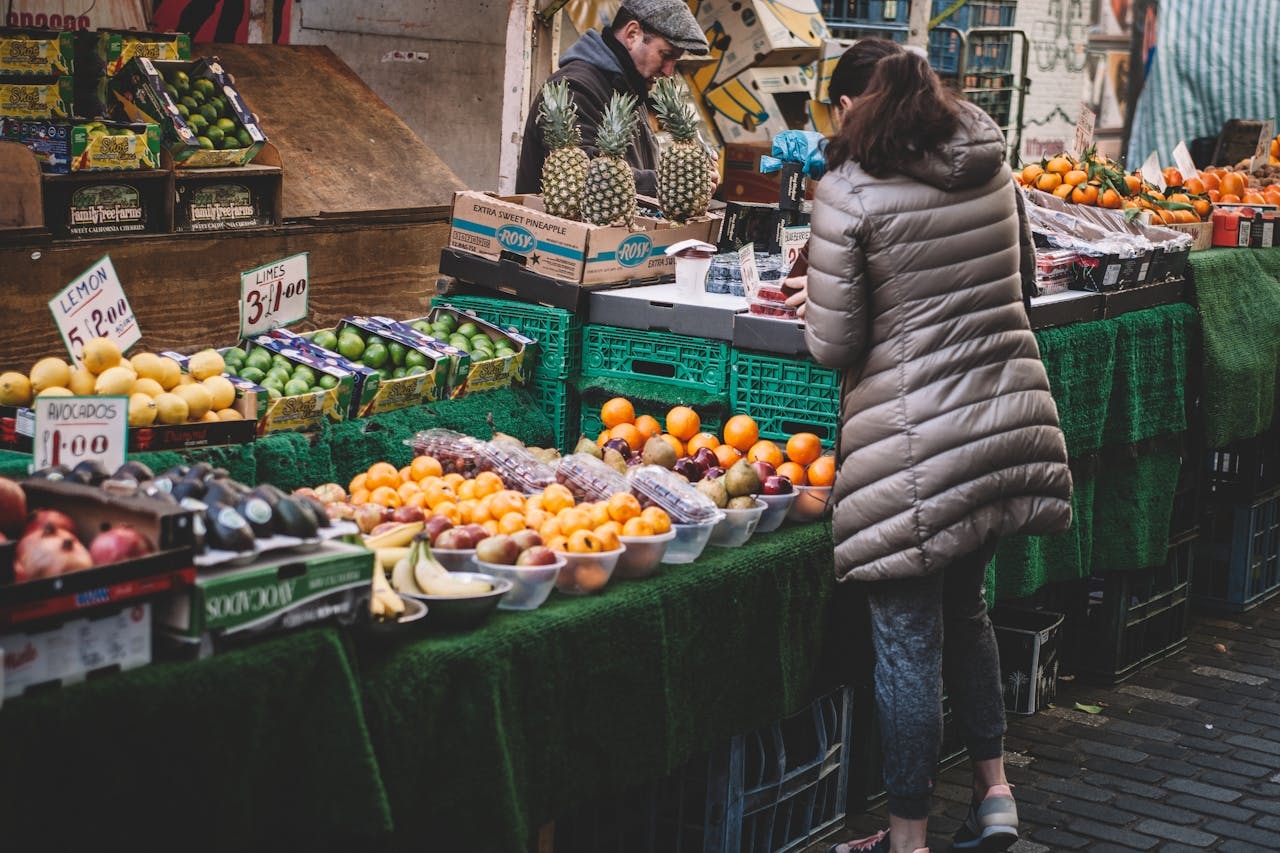Exploring the Source: Where Do Cafes Get Their Food?
By Nikita Nielsen · 12. March 2024
Where do cafes get their food?
The journey from farm to table involves several sources, such as local producers, wholesale vendors, and digital platforms.
This article explores how cafes fill their pantries with fresh and quality ingredients, maintain strong relationships with suppliers, and navigate the ever-changing food industry landscape.
Key Takeaways
- Cafes obtain their food from various sources including local farmers, wholesale suppliers, and online marketplaces, aiming to maintain quality while managing costs effectively.
- These establishments are not only about serving coffee and pastries; they are also committed to environmental sustainability, striving to offer the freshest ingredients with minimal environmental impact.
- It’s a strategic game for cafes to build strong relationships with their suppliers and stay ahead of food industry trends to offer specialty items and environmentally-friendly packaging that appeal to their customers.
Sourcing Food for Cafes: The Basics
 food market
food market
Beginning with the basics, every café relies on a network of cafe food suppliers to keep their customers satisfied.
These vital partners range from local farmers offering freshly harvested produce🍒 to wholesale distributors and digital marketplaces.
Partnering with local vendors isn’t as simple as picking the nearest farm. Cafes need to ensure these suppliers can meet their specific needs, offering high-quality ingredients that will delight their customers.
Local Suppliers
What makes local suppliers so attractive to cafes? Here are a few reasons:
- Sourcing fresh ingredients from local farmers and small-scale producers adds economic value to the community and promotes sustainable agriculture.
- Supporting local suppliers who use sustainable practices allows cafes to reduce their overall carbon footprint.
- It contributes to a more environmentally friendly food industry.
- It taps into the rising consumer interest in food origin.
This local focus also allows for creative taste profiles that align with current market trends, and let’s not forget the added bonus of savings in transportation costs.
Wholesale Distributors
Wholesale distributors are essential to the café world, handling an impressive variety of food products, including:
- Fresh produce
- Dairy
- Packaged goods
- Beverages
- Various meats
- Charcuterie
- Snacks
They even cater to specific café needs, offering a fantastic range of products with a great range to choose from.
It’s not just about variety, though. Buying in bulk from wholesale distributors offers several benefits for cafes:
- Lower prices
- Steady flow of supplies
- Logistics expertise and stringent quality control measures
- Convenient online ordering systems
These advantages make buying in bulk a smart choice for cafes.
Online Marketplaces
 online grocery market
online grocery market
Moving on to the increasingly popular online marketplaces. These platforms work 24/7, allowing cafes to order supplies anytime, anywhere.
No more juggling schedules to meet the operating hours of traditional stores or making time-consuming visits to suppliers.
Online marketplaces are a boon for cafes, offering:
- Cost-effective solutions by reducing overhead costs associated with physical storefronts
- A vast selection of products
- Streamlined communication channels, ensuring accurate and timely order fulfilment
- The ability to manage orders, track data analytics, and adjust inventory or pricing instantly to remain responsive to business needs
The Importance of Quality Ingredients
 grocery market
grocery market
The conversation about food sourcing for cafes would be incomplete without mentioning the significance of quality ingredients.
After all, they’re the key🔑 element in creating dishes with superior taste, texture, and overall quality, leading to heightened customer satisfaction.
Local suppliers often provide fresher and higher quality ingredients to cafes, enhancing not only the dishes’ flavor profile but also the café’s reputation for quality.
This focus on premium ingredients is key to capturing the spend of customers looking to treat themselves.
Freshness Matters
When it comes to ingredients, freshness is paramount. The aroma of fresh herbs, the vibrant colours of seasonal fruits and vegetables – these can significantly enhance the flavour and customer experience of café dishes.
Seasonally available produce offers peak freshness and taste, leading chefs to create menus around these high-quality ingredients.
Sourcing food from local suppliers also contributes to ecological diversity and benefits the environment, all while providing seasonal food options.
Ethical Sourcing
Ethical sourcing is another critical aspect of food sourcing. This practice involves acquiring products that respect both human rights and the environment, ensuring sustainable and responsible procurement.
For cafes, ethical sourcing is about more than just the end product’s quality. It’s about supporting a sustainable food system that values fairness, sustainability, and respect within the supply chain.
Plus, sustainable sourcing practices can align with business goals, creating a synergy between ethical practices and profitability.
Building Relationships with Food Suppliers
Shifting our focus, it’s important to discuss the building of relationships with food suppliers.
You see, sourcing isn’t just about finding the best products; it’s also about nurturing strong relationships with those who provide them.
Developing positive, long-term relationships with suppliers can lead to advantageous prices, superior products, or favourable terms of contract.
And when it comes to contract negotiations, the goal should always be to create partnerships that are mutually beneficial, rather than pursuing one-sided advantages.
Networking and Events
How, then, do cafes go about building these relationships? Networking at industry events is a great place to start.
Interacting with other businesses can provide access to new ideas, like collaborative promotions and cross-marketing, that can be advantageous for cafes.
Social media platforms like LinkedIn, Twitter, and Facebook are also valuable tools for networking with a broader range of industry professionals and exchanging valuable experiences.
And remember, networking is an ongoing process that requires regular contact, which can fortify supplier relationships and support advantageous negotiation outcomes.
Negotiating Contracts
Negotiating contracts is another critical part of building relationships with food suppliers.
Knowledge of factors like prompt payment discounts, delivery cost savings, and quality assurance protocols is crucial to securing beneficial terms for the cafe.
Being informed about current market prices and negotiating the right cost structure is also vital to securing fair contract terms.
And by providing suppliers with valuable and relevant business information, cafes can foster trust and potentially secure more favourable contract terms.
Adapting to Market Trends and Customer Preferences
Given the dynamic nature of the food and beverage industry, keeping up with market trends and customer preferences is indispensable.
For cafes, this means keeping a finger on the pulse of the industry through networking, attending industry events, and staying updated on popular food categories.
From modern comfort foods reinvented with sustainable and health-conscious ingredients to methods like fermenting, pickling, and curing to create low-waste menus, cafes are constantly adapting to meet diverse consumer interests.
And with the rise of visually exciting and tastefully unique dishes, the culinary world is more creative than ever.
Plant-based and Health-conscious Options
Plant-based and health-conscious options, for example, are rapidly gaining popularity, especially among Gen Z consumers.
Many cafes and coffee shops are even making plant-based milk the default option, reducing their carbon footprint and encouraging sustainable consumer choices.
Fresh ingredients like fruits and vegetables are staples in health-conscious café dishes due to their high nutrient content.
Cafes that include a variety of gluten-free, vegan bakes, and salads with superfoods are meeting the demands of customers focused on dietary restrictions and healthy eating.
Sustainable Packaging and Practices
Sustainable🌱 packaging and practices are another major trend in the café world.
Implementing sustainable packaging conveys a café’s commitment to environmental responsibility, attracting eco-conscious customers and boosting the café’s reputation.
Training staff on the importance of sustainable packaging and the proper ways to dispose of it fosters a cohesive approach to eco-friendliness within the café.
Plus, monitoring the effectiveness of packaging initiatives allows cafes to pinpoint areas for improvement and substantiate the value of sustainable practices to stakeholders.
Specialty Food Items: Standing Out from the Competition
Specialty food items serve as the perfect garnish to a café’s menu.
They play a crucial role in distinguishing a café’s offerings and attracting customers looking for unique dining experiences with different things.
Utilising premium ingredients such as high-quality olive oil or locally produced ripe cheese can dramatically enhance the taste profiles of dishes on the menu.
And incorporating international cuisine, local specialties, and innovative fusion dishes can provide a competitive edge by offering culinary diversity that sparks customer interest.
Artisan Baked Goods
Take artisan baked goods, for example. These handcrafted items significantly enhance a café’s menu.
Great Taste Award-winning bakes, such as Pastel de Nata, and options tailored for specific dietary needs, like vegan Peanut Butter Blondie, are examples of artisan goods that can elevate a café’s offerings.
Specialty food items aren’t just about indulgence; they’re about quality.
Chefs who prioritise quality ingredients for their baking can establish a unique and appealing menu, thereby attracting and retaining customers through their distinctive culinary creations.
Gourmet Sandwiches and Salads
Gourmet sandwiches🥪 and salads are another way to shine. High-quality, fresh ingredients can significantly differentiate a café, catering to health-conscious patrons and food lovers alike.
With the right equipment, preparing these delicious foods becomes even easier.
Providing a diverse selection of bread options for sandwiches and a ‘make your own’ option for both sandwiches and salads allows for the use of unique ingredients like edible flowers.
Sophisticated offerings, like signature club sandwiches and gourmet sandwiches with artisanal charcuterie and local cheeses, add a level of sophistication to the café’s menu.
Summary
In conclusion, sourcing food🍎🍐 for cafes is a complex process that goes far beyond finding the right products.
It’s about building relationships with suppliers, staying on top of market trends, and always striving for quality.
Whether it’s a locally sourced apple pie, a gourmet sandwich, or a vegan latte, every item on the menu tells a story.
And behind that story is a world of sourcing, negotiation, and careful selection that makes each bite worth savouring.
Frequently Asked Questions
How to find food wholesalers?
Check out online or offline wholesale directories to find new wholesale distributors for your food supplies. Online directories categorise different wholesale businesses for easy access.
How do I buy food for my cafe?
To buy food for your cafe, you can work with national wholesalers who source ingredients from a network of farmers and deliver goods via truck. You can place orders online, over the phone, or through an app, and they may also offer kitchen equipment.
What is a food supplier?
A food supplier is a vendor that sells products directly to food establishments, helping them purchase items at lower prices to boost their profit margins.
Why is it important for cafes to use quality ingredients?
Using quality ingredients is crucial for cafes because they ensure exceptional taste, texture, and overall satisfaction for customers. It’s the secret ingredient to keeping them coming back for more!

